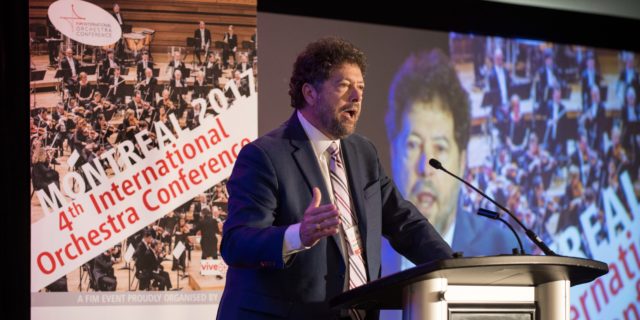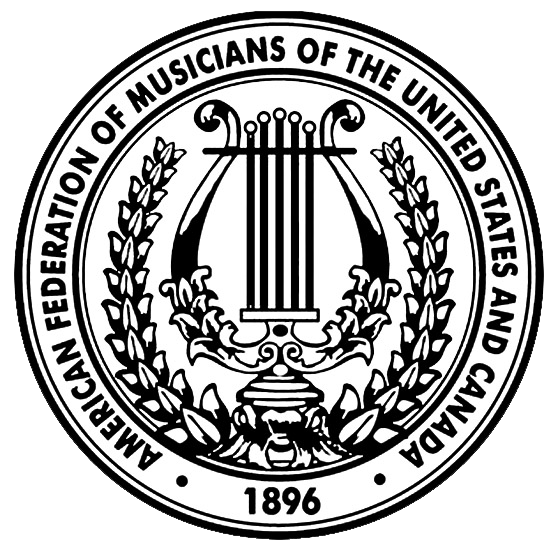Strength in Unity

AFM International President Ray Hair’s delivering his opening remarks to the 4th International Orchestra Conference in Montreal. Below is the full text of his speech.
On behalf of the entire membership of the American Federation of Musicians of the United States and Canada, I am pleased to welcome you to Montreal for the 4th International Orchestra Conference, presented by the International Federation of Musicians (FIM) and the Quebec Musicians Guild, AFM Local 406. We are gathered here in this wonderful city, in this beautiful country, to share information, experiences, and ideas that will benefit and enlighten musicians performing in symphonic institutions around the world.
As we talk about some of the challenges we face, I want us to do so in the context of the greater challenge that affects relationships between all of us—the same challenge we’ve always faced.
Those of us in this room who are musicians understand our passion as musicians to perform perfectly, not just because that is our livelihood, but because that’s what gives meaning to our lives. It’s who and what we are. It’s also about the pride we feel when we can control our own destiny through the making of music, and when we believe we are reaching our potential as musicians. It’s about being fairly compensated for the artistic excellence and the joy we bring to the world.
From the time we began to organize sound, we eventually understood that strength and harmony came from unity, from aligning ourselves together perfectly as musicians because we are stronger together.
Our issues always rest on that greater challenge—how can we achieve fair compensation and fair treatment commensurate with the power of our music?
What we’ve struggled with since the beginning—we make all the music, while everybody else makes all the money—is our eternal contest. How can we achieve fairness for what we do? We can get there if we apply the same principle that we live by when we perform as musicians, and if we have the will to do it. The answer is unity.
There Is Strength in Unity
AFM was born in 1896, just as innovative technology began to alter how the public consumed music, from the live stage, concert halls, and theater pits to analog audio and visual broadcasting in the 1920s and 1930s; high fidelity in the 1950s to digital distribution in the 1980s and 1990s; and now, satellite and web radio with Sirius XM and Pandora, and on-demand audiovisual streaming with Spotify, Apple, YouTube, Hulu, Amazon, Netflix, and others.
For musicians in the US and Canada the opportunity to drive a fair bargain with well-capitalized media companies depends largely on collective agreements bargained by the AFM.
A fair bargain for media was far easier in the day when the means of production and distribution of music was less efficient, more expensive, and less integrated.
The technological landscape is far different today. In the 21st century, we live in a time of convergence, where the marriage of digitization, production, and transmission technology has blurred the lines between broadcasting, streaming, and social new media. We are experiencing an unparalleled surge of innovation, resulting in a global techno-economic paradigm shift.
Today, control over the means of production and distribution, formerly separate in the analog world, but now digitally unified, has produced winners and losers. All you have to do is follow the money.
Let’s look at Google, YouTube, and Facebook. Last month, CNBC reported that Google and Facebook together will earn $106 billion from advertising this year. Analysts expect Google-owned YouTube to top $10 billion in ad revenue in 2017. How many of you in this room today work with orchestras that have clips on YouTube?
A couple of days ago, I went to YouTube and searched for the Chicago Symphony Orchestra (CSO), clicked on CSO’s May 8, 2015 performance of Beethoven’s 9th. (Very popular clip—more than 6 million hits.) Before I was able to access the Beethoven clip, the first thing I got was an ad about nasal congestion relief. Funny, because I had recently searched online for information about allergy medicine. Google, YouTube’s parent company, remembered that and enabled YouTube to target my interest in CSO to spot-play a specific advertiser—Rhinocort Allergy Spray.
I then searched for the New York Philharmonic, clicked on a clip of the orchestra performing Stravinsky’s Pulcinella. But first, I was forced to view an ad for a spelling and punctuation error application. Funny, because I frequently use free online spelling, dictionary, and thesaurus applications, when I’m writing my columns for the International Musician. Google knew that and targeted my search with related advertising.
Then, to round out the exercise, searching for a foreign orchestra clip on YouTube, I clicked on the Iceland Symphony Orchestra’s Mozart Clarinet Concerto in A Major. There again was the same allergy medicine advertisement that I’d seen a minute earlier in front of the Chicago Symphony Orchestra video. I refreshed the page and got an ad for a website promoting six-pack abs.
Years ago, there was very little money in clip and excerpt use online. Today, it’s been monetized into the billions. In its advertiser supported streaming model, YouTube is using content posted by the Chicago, New York, and Iceland orchestras to sell allergy medicine, and lots more. Do those orchestral institutions get a cut of YouTube’s
$10 billion in ad money, and if so, will the musicians who performed so perfectly in those clips ever receive their fair share?
The managers and agents certainly recognize the value musicians add to media. When our talent improves the financial well-being of the media industry, our livelihood should improve as well. If we surrender complete control over media production and distribution, we lose our leverage and our stake in the content and we cede higher economic ground to management, middlemen, agents, and others in the food chain. We lose control of our destiny and our ability to reach our potential as musicians. But we can fight this and win. We can make a difference if we work together, because we are stronger together and because in unity, there is strength. Through the power of our music, as Eric Clapton said, we can change the world.
